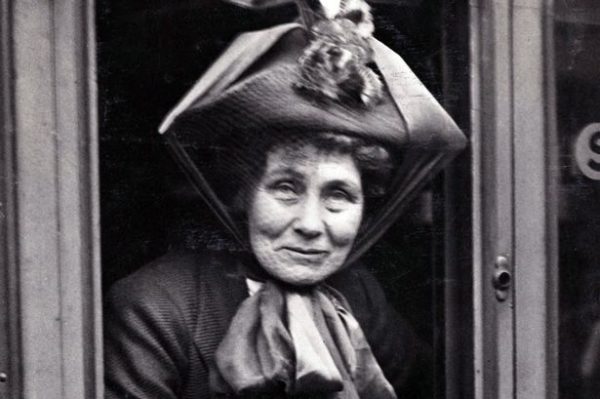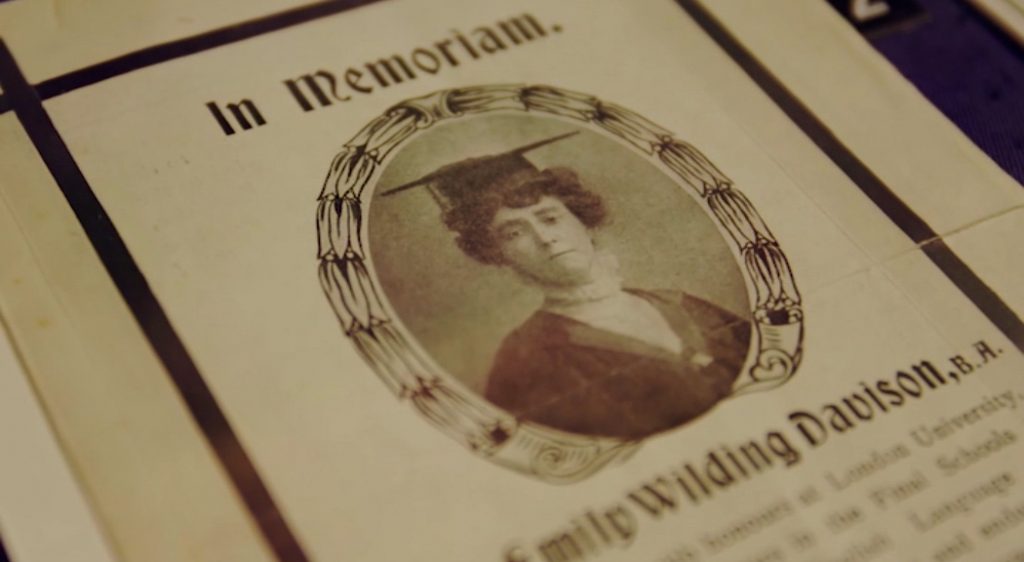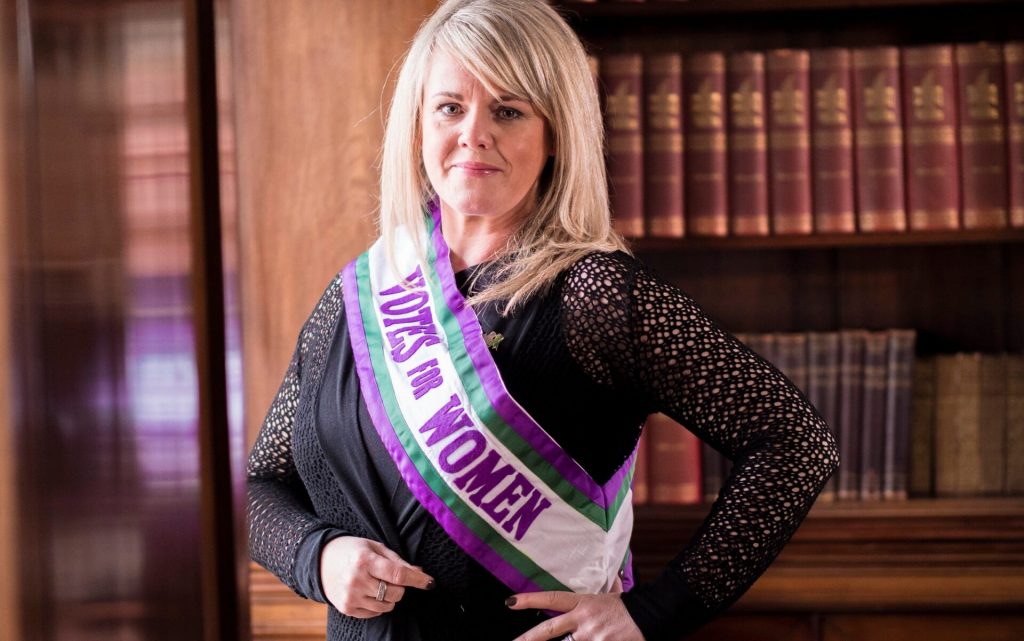by Sally Lindsay
I’d heard of Emmeline Pankhurst of course; growing up in Manchester, the original Suffragette City, the Pankhursts were part of our history but until we started making this documentary I was embarrassingly lacking in any knowledge about her as a person. I wanted to see what turned this Mum from Moss Side into the Militant General leading an army of Women to change the face of Britain.
What started out as a really interesting job offer, turned into one of the most inspiring, emotional experiences I have had in my 20 year TV career, and also one of the most personally transformational. I like to think we found the real Emmeline and put together the jigsaw pieces of her life to understand what made her tick; what made her so influential and indeed exceptional. We wanted to go beyond the standard archive images (most of which are in London at a later stage of her life ) to understand her as a woman of Manchester and what that meant.

Emmeline Pankhurs (Image: PA)
Born to very politically active parents Sophia and Robert Goulding, the young Emmeline showed signs of the future woman from a very young age. I loved the anecdote in Emmeline’s autobiography which tells the story of how, at the tender age of 14, she begged her mother to take her to one of her Suffrage meetings to hear “the great Lydia Becker”, one of the leaders in the early Suffrage movement. This became a day that would change Emmeline’s life as she says she came out of the meeting “confirmed suffragist”.
A keen reader, she read her beloved father’s paper out to him every day. She was only too aware how Lydia Becker and her contemporaries were vilified by the National press – as much for their appearance as their views, we were shown really horrible unkind political cartoons that made me obviously flash forward to women in politics today. So, it was really interesting to see that when at 42 she eventually formed the Woman’s Social and Political Union, she used the press’s scathing fascination of the Suffrage movement to her advantage. Always impeccably and deliberately femininely dressed, she realised, that even though she was ridiculed relentlessly, it was also brilliant PR for the movement as the papers would print every word she said, unintentionally spreading her message around the nation.
What I loved to discover was that an Emmeline who attended a finishing school in Paris, was also motivated to run soup kitchen vans across the city. She was a bright, glamorous woman, apparently with a lovely singing voice but from the earliest age, ready to carry on the political fight. At a political rally she met the celebrated Richard Pankhurst. Already a bit of a celebrity, as a confirmed Suffragist - Emmeline read of him first in the newspapers as a girl as he was involved in the Lilly Maxwell case - the amazing electoral coup when a Manchester woman voted some fifty years BEFORE the law was changed. It was fabulous to know, from letters, journals and the academics that I spoke to, that Emmeline was a bit star struck by Richard Pankhurst. Even though he was 20 years older than her it was love at first sight. Through her marriage we see how progressive Emmeline was; they had 5 children but she did not stay at home to look after them and be a ‘domestic machine’ but instead followed her political passions and was supported completely by Richard, who was making his name as a politician in London.

Still from Making of a Militant (BBC / Saffron Cherry Productions)
They returned to Manchester after the tragic death of their little four year old son Frank. Emmeline became a Poor Law Guardian of the local Chorlton workhouse. This role effected her deeply. She was horrified to see the terrible treatment of everyone in there but especially the women. Little girls scrubbing floors in the cold of winter in nothing more than a thin nightdress and heavily pregnant women doing hard labour, until the birth of their babies. These poor women were given two weeks to either give up their child and stay in the workhouse or be thrown out on the street with their babies but nothing else.
A fundamental turning point for Emmeline coming to the conclusion that the only way to change this horror was for women to get the vote so they could look after themselves. I believe this was the first step along the road towards militancy. When I read the testimonies and also Emmeline’s own words it was impossible not to be moved, more than a century on – essentially life as a woman was so much more challenging than I think it’s possible for us now to comprehend.
But tragedy was on the horizon for Emmeline. Whilst she was away visiting Europe, Richard continued to send her love letters, even after 19 years of marriage, “When you return we will have a new honeymoon and re-consecrate to each other the unity of the heart”. But this was not to be. Richard died of a short illness before she made it home. Legend has it that when she found out she collapsed with grief. I found this so emotional and poignant to film. I put myself in her shoes as not only has she lost her best friend and lover, she also is left with nothing and four children to care for. She somehow found the strength to carry on, moving to a smaller house (now the famous Pankhurst centre) and finding gainful employment.
She became a Registrar, (of Births and Deaths – women were not allowed to register Marriage) and I believe this was the final push she needed to start the WSPU. She was now paying taxes but still not allowed to vote which angered her greatly. She was also coming into contact daily with real people; very young girls coming to register their newborns whose fathers were almost always the girls’ own father. Emmeline had had enough. You can imagine her anger at the total denigration at these girls and feel it in her words, “if civillisation is to advance into the future it must be through the help of women, women freed of their political shackles”.

Sally Lindsay (courtesy of BBC)
The one Characteristic about Emmeline I find so inspirational is that she never gave up. She had one goal; Women’s Suffrage, and she stuck to it whatever horrors were thrown at her. And I think it is important to remind people that means Human Rights. She has a proper Lancashire accent, was a normal Mancunian mum, with all the daily grind that comes with, and I believe that’s what made her so exceptional as she would never ask her followers to do anything she wouldn’t do, evident in her suffering numerous prison sentences and 13 horrific force feeds.
I will remember her as an activist, campaigner and warrior for human rights and equally as a mum and wife which makes the sacrifice the more poignant and continuing to inspire women across the globe till this day. And today, I think women need her words more than ever in the wake of #metoo and #50/50, women have always fought for men and their children, now they were ready to fight for themselves and as we all know the fight goes on.
(this article first published in the Daily Telegraph)
About the Author:
Sally Lindsay is an English actress and television presenter known for her roles as Shelley Unwin in the long-running ITV soap opera Coronation Street and Kath Agnew in the BBC sitcom Still Open All Hours. She is presenter of Emmeline Pankhurst: The Making of a Militant (BBC / Saffron Cherry 2018).